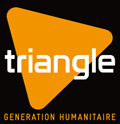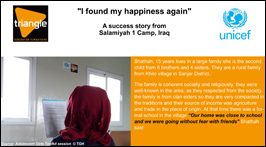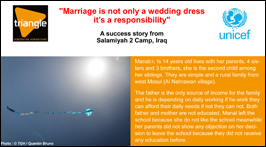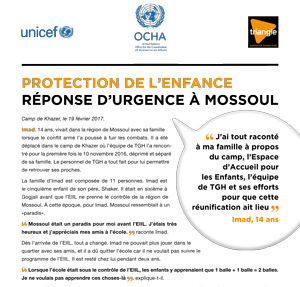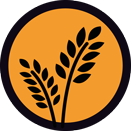Since 2003, Iraq has faced a succession of crises and conflicts that have severely affected the population. Since 2014 and the emergence of the Islamic State (IS) in the northern and western areas, the security situation has considerably deteriorated. Part of the population had to flee, either in internally displaced persons’ (IDP) camps or abroad. Other stayed and had to live for several years under the occupation of the group. In 2016, the Iraqi government regained possession of the entire country, but it is still facing many structural issues.
On October 1st, 2019, large-scale social protests erupted in Baghdad and then spread to the south of the country. Initially focused on specific issues such as youth unemployment, poverty and corruption, the demonstrators' demands gradually shifted towards a general desire to overhaul Iraq's socio-political system. Several hundreds of demonstrators were killed due to the repression of the demonstrations by the security forces. The protests were constrained by the COVID-19 pandemic and the establishment of a new government in May 2020.
Iraq is now facing new challenges, including economic and socio-political ones. These challenges must be addressed in order to build a lasting peace and to ensure the security of a divided country, marked by the aftermath of chronic wars. Furthermore, Iraq is the battleground of competing countries, in particular the United States and Iran. During Donald Trump’s presidency, the Iranian-American relations deteriorated. Indeed, Trump applied a policy of maximum pressure against Iran, illustrated by the withdrawal of his country from the Iranian nuclear agreement (JCPOA) and the assassination of Iranian General Qassem Soleymani in Baghdad in January 2020. This tension is expressed in Iraq where Iraqi bases housing American forces are regularly attacked by Iraqi militias supported by Iran, destabilising the country.
In total, nearly 6 million Iraqis have been displaced by the conflict since 2014¹, when ISIS took Mosul. As of 30th September 2021, almost 1.2 million Iraqis were still displaced across the country². They have sought to refuge in camps located mainly in the Governorate of Nineveh, near Mosul, as well as in urban areas, particularly in the Iraqi Kurdistan Region. In addition to these displaced population, refugees from neighbouring countries, mainly from Syria, also seek refuge in Iraq. Insecurity, lack of infrastructure and living conditions deteriorated by the conflict are protracting the exile of displaced populations. Nevertheless, the Iraqi government is today implementing a policy of camp closure and encouraging return. Indeed, in 2021, more than 4.9 million Iraqi people went back to their areas of origin². However, for the returns to be durable and not feeding conflicts, it is necessary that they come with measures allowing access to basic services and livelihoods.
Social and community equilibrium have been severely weakened by the conflict, with a predominant Shia population, a Sunni minority, often perceived as ISIS supporters and other minorities (Yezidis, Christians and many other groups) severely affected by the conflict. Divisions are deep and segregation along community lines is a reality in conflict-affected areas. Despite the recovery of the entire territory occupied by ISIS, dormant cell maintains instability in some areas. Furthermore, former conflict areas remain in a precarious situation: mined land, destroyed homes and buildings, lack of infrastructure and basic public services.
In these circumstances, access to formal education is very limited for many children. Many of them are at-risk and require protection. Difficulties resulting directly from the conflict are adding to the frailty of the educational system, the distance from schools and school fees. The loss of administrative and legal documents, particularly common in conflict situations, prevents access to public services, including education.
50% of schools have been destroyed in the governorates affected by the fight against IS. For the many children who have been out of school for five years or more, reintegration into the mainstream school system is difficult. The majority of out-of-school children are adolescents whose distress is reported by parents and social workers. This population is subject to social marginalisation and is particularly exposed to child labour, early marriage, recruitment into armed groups and is at risk of radicalisation.
In response to these vulnerable situations, TGH is setting up child protection programmes. Through its specific child protection unit, TGH provides psychosocial support to thousands of children and their families in Ninewa Governorate (Baaj, Hatra). TGH coordinates the care and response provided to child protection cases requiring external support (medical NGOs, national child protection services, etc.) to ensure children receive the most appropriate care.
In addition to its child protection activities, TGH is implementing national capacity building for actors involved in child protection, especially the Ministry and the Department of Labour and Social Affairs (MoSA/DoSA). TGH has played a significant role in the development of child protection guidelines in both Iraqi Kurdistan and federal Iraq.
TGH adapts its protection actions to the needs of the population who, following camps closure, are returning to their areas of origin. These returnees are facing new needs and have to develop sustainable livelihoods in order to resettle in a dignified and sustainable manner. To this end, TGH provides, through several projects, vocational training to enable returnees, particularly young people, to develop livelihoods, with for example business creation activities. These trainings are equally offered to non-displaced populations in order to respond to their needs, and to avoid creating tension, while promoting social cohesion.
TGH is also implementing Food Security and Livelihood programmes, focusing on water resources management, rehabilitation of agricultural infrastructures, veterinary care, economic recovery and local empowerment. These programmes aim to rebuild and boost the economy, to support returnees and to stabilise affected areas.
1International Organization for Migration (IOM), Iraq
2International Organization for Migration, displacement tracking matrix, url: http://iraqdtm.iom.int/
